Al Haj Mohammed Abdul Bakeer Markar
A statesman of a rare breed

Mohammed Abdul Bakeer Markar (12 May 1917 – 10 September 1997) was an eminent Sri Lankan politician and civil servant. He was the Speaker of the Parliament of Sri Lanka and the Governor of the Southern Province. M.A Bakeer Markar caught the imagination of a nation beyond a statesman as a humanist and an ambassador of goodwill.


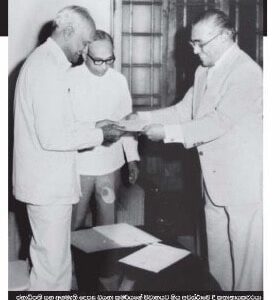
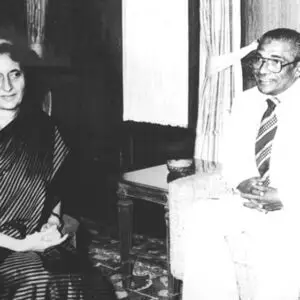
The respected lawyer of the Kalutara Bar, the physician, MP for Beruwala who lived in the hearts of the masses, and later the Speaker of the Parliament who stood for the grievances of the destitute, the Governor for the Southern Province and the humanitarian extraordinaire, Al Haj Mohammed Abdul Bakeer Markar stopped his Volkswagen to offer a ride to many of his people in his hometown of Beruwala who waited to board a bus. His Volkswagen largely served as means of public transport.
Making history as the last Speaker of the old Parliament at Galle Face and the first Speaker of the new Parliament in Sri Jayawardenepura, M. A Bakeer Markar : “I am proud to be a Sri Lankan, for here in Sri Lanka a man can freely worship God in his accustomed fashion.”
The son of the soil who envisioned ‘one identity under one nation’, was born on May 12, 1917 to Hakeem Alia Marikkar and Ismail Marikkar Rahila Umma. Having opened his eyes to the world in Hakeem Villa in Beruwala- home to a long line of physicians of the Unani tradition, it was only too natural for young M.A Bakeer Markar to follow the footsteps of his father’s and those of his ancestors before him. He grew up to be a lawyer and politician by profession and a physician by passion.
A leader in making
Young Abdul Bakeer Markar was admitted to St. Sebastian’s School Hulfsdorp in 1924 for his primary and secondary education. Later he joined Zahira College Colombo for higher education. He was twice appointed the Speaker in Zahira College Student Parliament. He also led the Sinhala and Tamil Literary Associations in school.
He was also the editor of the college magazine Crescent. Young Bakeer Markar was a convincing speaker and a gifted debator fluent in all three languages- early signs he displayed as a promising politician.
At Zahira, Bakeer Markar came under the influence of the late Dr. T. B Jayah, one of Sri Lanka’s best-known educationists and politicians. This mentoring had a long-lasting impact on Bakeer Markar’s political journey. When Dr. Jayah contested the Labour leader A.E. Goonesinghe at the general elections of 1946 to the State Council, Bakeer Markar, then the Sub-Warden at Zahira College, was entrusted the task of carrying out his mentor’s election campaign. He did a commendable job and Dr. Jayah was elected to the State Council.
Legal career
Bakeer Markar entered Law College in 1939. His legal career, however, was interrupted during the World War II as he took up duties in Civil Defense Services in 1942. It was in 1949 that Bakeer Markar was able to resume his legal studies. In the same year he was elected a member of the Maradana Ward of the Beruwala Urban Council, uncontested, and was elected as the Mayor of the Council. This was his entry to politics. The following year, he passed out as a lawyer and commenced his legal practice at the Kalutara Bar in 1950. In 1972 he became the President of the Kalutara Bar Association. A man of integrity and principles, Bakeer Markar would always appear pro bono for destitute women who came for maintenance cases. As a father of six daughters, his conscience would be such. Taking a cue from their President, the entire Kalutara Bar took a policy decision of appearing free of charge for maintenance cases.
Politician par excellence
His home electorate of Beruwala has been a melting pot of ethnic diversity and a downright image of a collective Sri Lanka. In 1960 Bakeer Markar contested for the general election on the United National Party ticket and and won the Beruwala seat, becoming the first Member of Parliament to represent Beruwala.
“Though I belonged to the minority community, I was able to enter the national and international arena only because I was able to go forward with the majority community,” were words spoken by Bakeer Makar himself as an advocate of national unity. In his efforts to unite the Muslim youth with the Sinhalese, Bakeer Makar earned the affectionate nickname Sinhala Bakeer . In his address to Parliament on the Appropriation Bill on August 24 1965 congratulating the then Finance Minister U.B. Wanninayake, he said: “I should like to do it in a more unorthodox way because I think the man to be congratulated is the Prime Minister, for he chose as Minister of Finance, a person who is Ceylonese in every sense of the word.” Again, speaking on the special allowance to plantation workers on October 6, 1965, he spoke on behalf of the estate workers, referring to them: “If we are Ceylonese, they are Ceylonese; if the Sinhalese are Ceylonese, they are Ceylonese; if the Muslims are Ceylonese, in the same way, the estate Tamils are Ceylonese.”
Sri Lanka was known as Ceylon until 1972 and Sri Lankans were then called Ceylonese
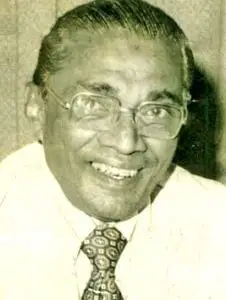
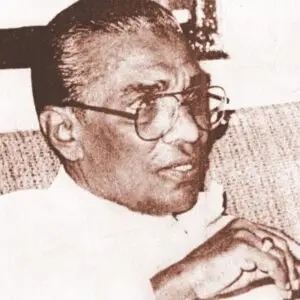



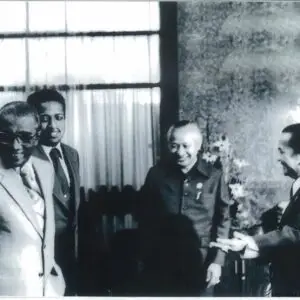

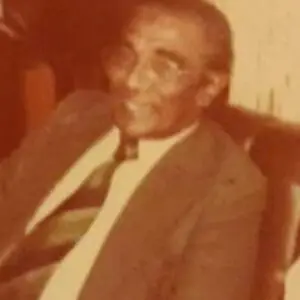

The Speaker of grit
His victory at the General Elections of 1977 was a turning point in his political career. In an electorate with just 8% of Muslims then, Bakeer Markar won with a majority of 27,000 votes which was an index to his popularity among the majority. On August 4, 1977, Bakeer Markar was elected the Deputy Speaker. Following year, he was elected to the high office of Speaker unanimously chosen by both the Government and the Opposition. He was the last Speaker of the old Parliament at Galle Face and the first Speaker of the new Parliament in Sri Jayewardenepura.
On his elevation to the position of Speaker, Bakeer Markar stood by the great traditions and decorum of the Speaker’s Office. The Office of the Speaker was made significant. The mace was not any more mere symbolic, but it was made the due symbol of authority. The Speaker’s traditional robe was reintroduced and dignity was restored in the Speaker’s office.
Speaker Bakeer Markar saw to it that the annual audit of the parliamentary administration was brought under the direct supervision of the Auditor General, making parliamentary affairs and administration transparent. As the Speaker, he also maintained an excellent rapport with the diplomatic community. A man of justice, he assured that equal opportunities were given to all Members of Parliament in terms of their overseas tours of duties.
During his five-year office as the Speaker (1978 to 1983) Bakeer Markar also served as the Chairman of the Petition Committee of the Parliament which entertained public grievances through MPs. Bakeer Markar derived a lot of self-satisfaction by finding solutions to public grievances, so much so, he continued to hold this post even after he resigned from the Speaker’s post.
Acting President
Speaker Bakeer Markar also had the rare privilege of presiding and carrying out duties as the Acting President of Sri Lanka whilst President J.R. Jayewardene and Prime Minister R. Premadasa were away from the country in 1981, to attend the royal wedding of Prince Charles and Lady Diana.
During his period of office as the Speaker, Bakeer Markar also gave muscle to the tourism industry in the country. Having founded the Beruwala Tourism Zone, he became the catalyst in promoting Beruwala as a tourist attraction. Many direct and indirect job opportunities were created under this scheme as well as several new hotels in the area. A tourist police station was also established in Moragalla area.
After his resignation as the Speaker on August 31, 1983, he was sworn in as a Cabinet Minister on the same day. He also authored the book- Yen Singhalam which spoke of the importance of the then Muslim Children learning the Sinhala Language so they could engage with the mainstream.
He resigned from Parliament on June 31, 1988 and became the Governor of the Southern Province.
People’s person
Being the people’s man’s he was, Bakeer Markar had a large heart. He made it certain that people who visited him at his home were made comfortable at all times. Although coming from a privileged background and a notable ancestry, Bakeer Markar was most unassuming. No matter who turned up uncalled at meals times at his ancestral home, there was a seat at the table and extra food.
Mohammed Abdul Bakeer Markar dreamt that, “the time is not far off when Ceylon will sit in the Assembly of Nations, as a well-developed country and take its rightful place there and play its role.” It is left for the younger Sri Lankans to make the sentiments of this exceptional statesman a reality- the kind of statesmen Sri Lanka needs more than ever before: men who are cast of a different clay to realise, “one identity under one nation”.
Ambassador of goodwill
Beyond politics, Bakeer Markar was also an ambassador of goodwill for Sri Lanka. He established close connections with the Iraqi Government. Through this connection, he built an entire village named after Saddam Hussien in Eravur, in the East. He was the founder President of the Iraq-Sri Lanka Friendship Association and remained in that position until his demise.
In the early 1970s, when the plane carrying the returning Indonesian Haj Pilgrims crashed in Sri Lanka, it was Bakeer Markar, then as Speaker of the Parliament of Sri Lanka, rushed to the scene of the incident and took personal interest to have the bodies of the pilgrims dispatched to Indonesia. As a token of appreciation, the President of Indonesia personally invited him to visit his country. The Indonesian Haj Memorial Building at Katunayake was also initiated by him.
Bakeer Markar took great interest in social empowerment. He was the founder President of the All Ceylon Union of Muslim League Youth Fronts and the Vice President of the All Ceylon Muslim League. He was also the Chairman of the Beruwala, Maradana Mosque Jamaath until his demise. He also took great pains to renovate Sri Lanka’s first mosque- Masjid Al Abrar in his hometown of Beruwala. In this exercise, he was conscious of retaining the original architectural splendour of the mosque.
“And your Lord has decreed that you not worship except Him, and to parents, good treatment. Whether one or both of them reach old age [while] with you, say not to them [so much as], ‘uff,’ and do not repel them but speak to them a noble word.”
Surah Al-Isra, Verse 23